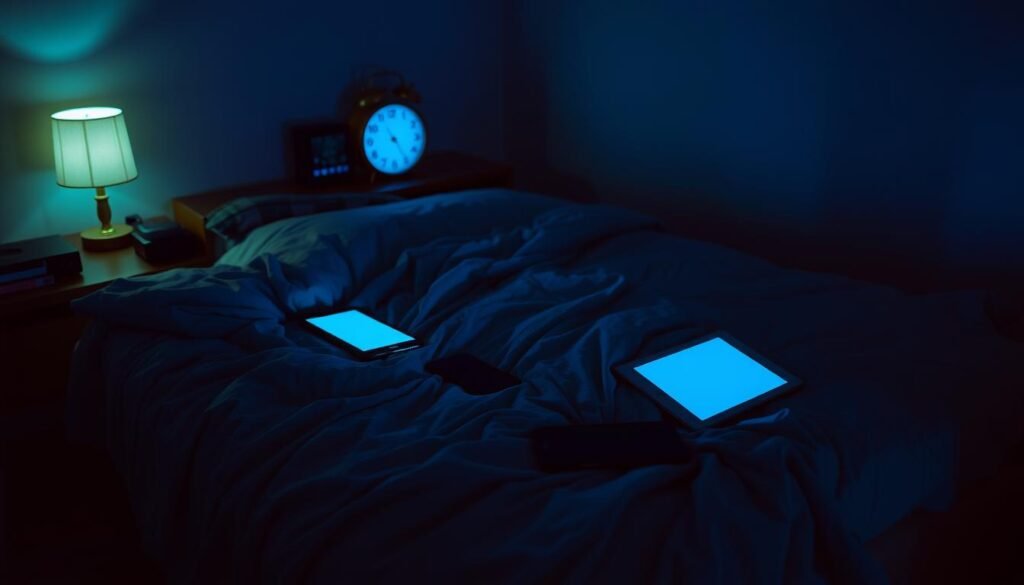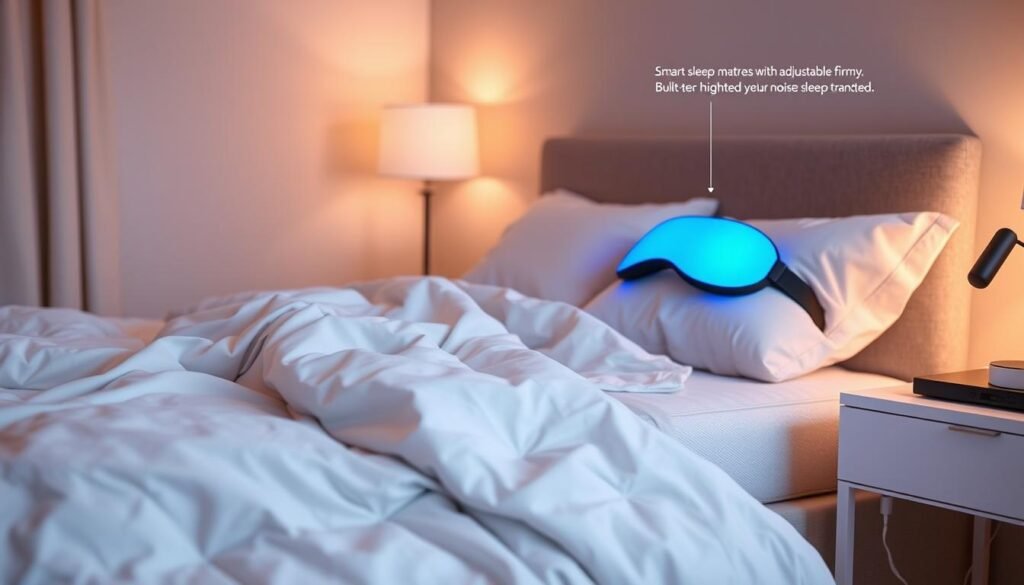Our lives are full of technology. It’s important to know how it affects our sleep. Gadgets like phones and laptops emit blue light. This light can mess up our sleep cycles and melatonin levels.
About 75% of kids and 70% of grown-ups use devices in their sleeping areas1. The average home has five electronic gadgets. Some even have more than ten1. Using these devices can make us go to sleep late. It also cuts down how long we sleep.
A huge 95.1% of people have smartphones in their bedrooms. And, 80.7% use them quite a bit2. This habit makes it harder to fall asleep. It also greatly raises the risk of feeling super tired during the day2. Experts say sleeping without gadgets can make our sleep better. This reduces chances of sleep trouble.
Key Takeaways
- Modern gadgets significantly impact *sleep quality* due to blue light exposure.
- Around 75% of children and 70% of adults use devices in their bedrooms1.
- Electronic device use can lead to delayed sleep onset and increased daytime sleepiness2.
- Creating technology-free environments can improve overall *sleep quality* and reduce disturbances.
- Utilizing blue light glasses or night mode settings can mitigate some negative effects.
The Impact of Blue Light on Melatonin Production
Blue light affects our sleep-wake cycles. It lowers our body’s melatonin, which helps us sleep. Too much blue light from phones and tablets makes it tough to fall asleep3.
How Blue Light Affects Sleep Hormones
Blue light changes our sleep routines more than other lights3. It can mess up when we feel sleepy, making it hard to fall asleep. Using devices at night lowers melatonin, worsening sleep. This bad timing can also lead to other health problems34.
Strategies to Mitigate Blue Light Exposure
There are ways to deal with blue light for better sleep. Using blue light filters on devices helps. Wearing special glasses at night can also protect us3. Turning off devices before bed and using certain lamps can help too. These steps improve sleep. They also help students sleep better and fall asleep sooner4.
Electronic Devices and Bedtime: A Disruptive Combination?
Nowadays, it’s normal to find electronic devices in our bedrooms. But, this convenience has a downside. These screens can mess up our sleep.

Gadgets like smartphones and tablets disturb our sleep. They bring good things but also make bedtime harder.
Common Devices That Interrupt Sleep
We often use devices before bed. Scrolling on phones or watching tablets can ruin sleep quality. A study shows 98.1% of students use a device before sleep, which hurts their sleep5. Devices like tablets and laptops delay sleep by affecting melatonin, the sleep hormone.
The Role of Smartphones in Sleep Disturbances
Smartphones are a big reason for poor sleep. They’re always with us and keep us connected. A survey found 60% of kids use them before bed. The beeps and buzzes keep our brains busy and harm our sleep. Also, 92.3% of students use their phones in bed, showing how common it is5.
Research Studies on Technology’s Impact on Sleep
A lot of research links bad sleep to electronic devices. More use before bed means worse sleep and more body weight, and distraction electronic devices and sleep5. Experts say cut screen time 30 to 60 minutes before bed6. Studies suggest reading printed books instead of e-readers for better sleep6.
Technology and Sleep: Finding a Balance
To improve our sleep, we need to find the right mix. We must use new sleep tech wisely. It’s about knowing the good and bad. This helps us make better choices for our sleep health.

Are Sleep Tracking Devices Helpful?
Sleep trackers are big now. They check how we sleep and spot problems. Many people like them for improving sleep. But a study shows 77.2% of medical students did worse in school because of sleepiness7. This shows that, while helpful, we shouldn’t depend too much on these gadgets.
Innovative Sleep Tech: The Pros and Cons
New sleep tech brings many pluses. Like beds that change firmness and apps that guide our sleep. But, screen light can hurt sleep by messing with melatonin8. It’s key to turn off tech before bed. Using blue light filters helps too8.
It’s about finding the right balance with tech8. Technology changes our sleep cycles. Using “Do Not Disturb” and keeping a regular sleep schedule can help. Supporting our health journey with the right tools is crucial. Even with cool new tech, we need to be careful to sleep well.
Creating a Technology-Free Bedroom
A bedroom without tech is peaceful. It helps you sleep better. Let’s look at ways to keep devices out of your room. We’ll also check out some other ways to relax that help you sleep better.
Steps to Eliminate Devices from Your Sleeping Space
To start, take all gadgets out of your bedroom. This is hard for many. About 85% use their phones or tablets before sleeping9. But, keeping gadgets away helps a lot. Most people, about 70%, keep their phones close by when they sleep9. This can wake you up at night.
Try putting your devices to charge outside your room. This helps you not to use them. It also means you won’t be woken up by beeps or rings. This helps your brain take a break from the day10.
Also, taking tech out of bedrooms means families talk more10. This can make relationships stronger. It makes bedtime chats better, improving sleep.
Alternative Relaxation Techniques Before Bed
Without gadgets, try calming activities to sleep better. Reading at night helps many sleep quicker10. Pick up a real book or magazine to relax your mind.
Mindfulness or meditation also work well. They help you focus on now, not stress. Doing these before bed helps you fall asleep faster and sleep deeply. Ditching tech at bedtime helps 75% of people sleep quicker9.
Keeping a journal by your bed is good too. It lets you write down thoughts or things to do. This can stop you from waking up later.
So, making your bedroom tech-free isn’t too hard. By removing gadgets, adding new habits, and trying relaxation ways, your sleep gets much better.
Sleep Patterns Affected by Technology in Children and Adults
Technology’s rise affects how kids and adults sleep. We must know how too much screen time harms our sleep. This knowledge helps us make our society healthier.
Impact on Children’s Sleep Quality and Health
A lot of studies show kids’ sleep suffers due to tech. For example, 55% of young kids with sleep problems watched TV at night. Only 33% without issues did11. Also, little ones, 3 to 5, who played on tablets at night slept less11.
Using many types of tech led to worse sleep for kids11. Nighttime screen use cuts down melatonin, making bedtime tough. It makes kids tired the next day too12. Limiting screen time at night and getting sunlight during the day is key. Click for further reading for more tips.
How Digital Overuse Affects Adults Differently
Adults face different sleep issues from too much screen time. Bright screens at night mess with our melatonin. This delays our sleep cycle by 1.5 hours over five days13. It makes falling asleep hard and disrupts our sleep.
Too much time on phones can reduce important REM sleep. REM sleep is crucial for thinking clearly12. So, it’s wise to relax by reading or listening to music before bed. Using devices on a night mode also helps13. For more info, check the disclaimer at Health Fitness Science here.
Conclusion
Looking at how tech affects our sleep, it’s clear we need to control its use for better rest. Devices emit blue light that stops melatonin, which we need to sleep well14. Using phones or computers before bed can also make it hard to fall asleep14.
Teens are really feeling it, with studies of 253,904 showing tech leads to sleep issues15. They are now 16% more likely to get under seven hours of sleep than ten years ago. This is mostly because of using devices before sleeping16. With most homes having TVs and computers, it’s tough to avoid screentime16. This doesn’t just cut sleep time but also breaks up our sleep and makes it hard to wake up feeling good14.
To sleep better, try having a room without technology. Set a time to stop using devices and relax before bed. Taking care of how we use tech can make our sleep much better. It also helps our overall health. We should keep up with research to improve our sleep as tech changes. Check out this health and wellness blog for more on tech and sleep, plus tips for a better sleep setup.
Source Links
- Technology in the Bedroom – https://www.sleepfoundation.org/bedroom-environment/technology-in-the-bedroom
- The impact of bedtime technology use on sleep quality and excessive daytime sleepiness in adults – https://pmc.ncbi.nlm.nih.gov/articles/PMC8906383/
- Blue Light: What It Is and How It Affects Sleep – https://www.sleepfoundation.org/bedroom-environment/blue-light
- Impacts of Blue Light Exposure From Electronic Devices on Circadian Rhythm and Sleep Disruption in Adolescent and Young Adult Students – https://www.chronobiologyinmedicine.org/journal/view.php?number=167
- Electronic Device Use before Bedtime and Sleep Quality among University Students – https://pmc.ncbi.nlm.nih.gov/articles/PMC8466496/
- Technology’s Impact on Sleep: Screen Time, Blue Light, and More – https://sleepdoctor.com/technology/
- Digital technology and its impacts on the sleep quality and academic performance during the pandemic – https://pmc.ncbi.nlm.nih.gov/articles/PMC9770061/
- Sleep and Technology: Finding a Healthy Balance in the Digital Age – https://www.olara.com.au/blogs/lifestyle/sleep-and-technology-finding-a-healthy-balance-in-the-digital-age?srsltid=AfmBOoragqnLz-zdArcrVyVSiHCzMHC7H6RFMJhzk2PLcjtV_rJCLrKU
- Creating a Tech Free Bedroom – The Mattress Hub – https://mattresshub.com/creating-a-tech-free-bedroom/?srsltid=AfmBOop3RpM3yKjsSXvtf9IEeu5u5Af8dBQa_eguQ1Mrak8LxrEJWf46
- 11 Reasons to Create a Technology-Free Bedroom – https://www.becomingminimalist.com/technology-free-bedroom/
- Influence of technology on sleep among young children – Louis A. Faillace, MD, Department of Psychiatry and Behavioral Sciences – https://med.uth.edu/psychiatry/2023/02/21/influence-of-technology-on-sleep-among-young-children/
- How Electronics Affect Sleep – https://www.sleepfoundation.org/how-sleep-works/how-electronics-affect-sleep
- Technology and Sleep – https://www.sleephealthfoundation.org.au/sleep-topics/technology-and-sleep
- The Impact of Technology on Sleep Patterns: Finding Balance in a Digital Age – https://info.ancsleep.com/blog/the-impact-of-technology-on-sleep-patterns-finding-balance-in-a-digital-age
- Sleep problems in excessive technology use among adolescent: a systemic review and meta-analysis – Sleep Science and Practice – https://sleep.biomedcentral.com/articles/10.1186/s41606-018-0028-9
- Technology and Sleep: How Technology Affects Sleep in the Internet Age – Sleep Junkie – https://www.sleepjunkie.com/technology-and-sleep/
